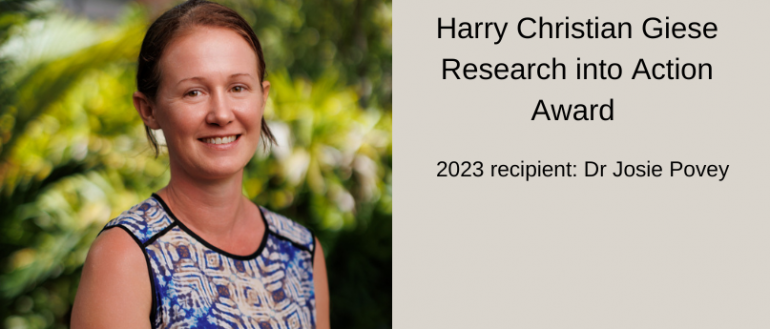Harry Christian Giese AM MBE (1913-2000) was a pioneer of health and education in north Australia and a key founder of the Menzies School of Health Research. From the late 1970s, he was on the National Executive of the Menzies Foundation, and later the School’s Board, until 1995. He served the people of the Northern Territory for 50 years.
Harry Christian Giese Research into Action Award
Previous Award Recipients
Ngirramini ngini awarra yimanka api awarra ngawurrangurumiga – ‘We look after the story that we made’
Dr Josie Povey’s project will build on work done during 2019-20 through the Ngawurramangajirri (‘We care for each other’) initiative. In collaboration with community leaders, a Tiwi-language digital resource for mental health and wellbeing will be created, developed and distributed. The aim is to improve mental health literacy, self-awareness and self-management, while strengthening connections to language and culture.
Adaptation of the Vaccine Barriers Assessment Tool (VBAT)
Dr Bianca Middleton's (2022) work in validating the Vaccine Barriers Assessment Tool (VBAT) to encourage early childhood vaccination for Aboriginal and Torres Strait Islander families, aims eventually to be part of a national roll-out.
Improving education and follow-up for severely malnourished children in Dili, Timor-Leste
Improving the treatment of malaria: working with communities and policy makers to facilitate the translation of research outcomes into better policy and practice
Associate Professor Kamala Thriemer (2018 award recipient) sends out a regular newsletter about work on clinical malaria trials with communities in Cambodia, Indonesia, Pakistan and Ethiopia. This was started during the COVID-19 lockdowns, when travel and on-the-ground networking became impossible. Visit the Malaria 'EFFORT' project page to read past editions of the newsletter.
Sharing the Diabetes in Pregnancy Story
Associate Professor Renae Kirkham (2017 award recipient) is Lead of the Diabetes across the Lifecourse: Northern Australian Partnership, supporting a program with Aboriginal and Torres Strait Islander people to break the cycle of type 2 diabetes.
Closing the loop on life-threatening melioidosis infections: observational research informing clinical practice change and policy for adults with severe kidney disease
Professor Jaquelyne Hughes (2016 award recipient), is the first Indigenous kidney specialist, and Matthew Flinders Professor at the College of Medicine and Public Health, Flinders University. Professor Gail Garvey (2015 award recipient) is NHMRC Leadership Fellow at the University of Queensland, Faculty of Medicine, working in cancer care.
Supportive Cancer Care Needs Assessment Tool for Indigenous people with cancer - Project Implementation
Artesunate-mefloquine vs. chloroquine in patients with acute uncomplicated Plasmodium knowlesi and Plasmodium vivax malaria: a randomized open label trial in Sabah, Malaysia (ACT KNOW trial)
Associate Professor Matthew Grigg (2014 award recipient) is part of a malaria study across eight sites in Indonesia, including human surveillance for zoonotic malaria; monkey camera estimates; mosquito trapping; and geospatial analysis of human risk of infection. A new Malaysian Army cohort study will look at exposure to zoonotic infections and malaria in those posted to remote forest areas. Matthew's post-doc student Jacob Westaway is analysing parasite strains from East Malaysian monkeys, to see if any are associated with transmission or disease severity in humans.
Azithromycin Bronchiolitis Interventional Study (ABIS2)
Gabrielle McCallum | 2013
Dr Gabrielle McCallum received this award in 2013, to champion the translation of lung health research into medical practice. Today, her team are studying children hospitalised in Australia and New Zealand for lower respiratory infections and are extending this work to Timor-Leste. She is also completing the editing of a special series, Frontiers in Paediatrics. A gap in the delivery of clinical care to paediatric patients with bronchiectasis, chronic lung disease, as they move into adolescence, has also been discovered.

